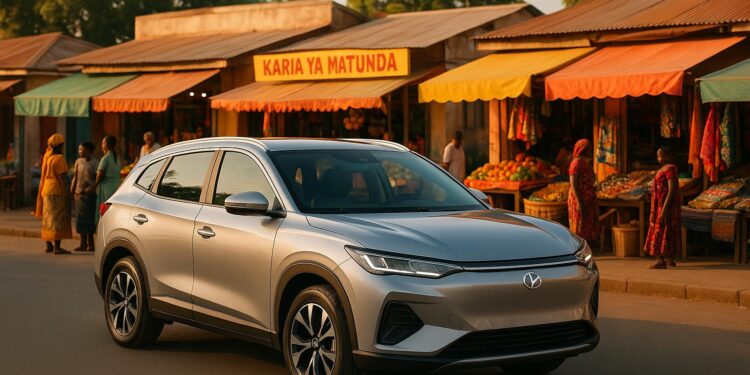Chinese automakers are eyeing Tanzania as a gateway to East Africa‘s growing car market. Here’s why it matters:
- Tanzania’s Market Potential: Rising middle class, urbanization, and economic growth (projected 6% GDP growth in 2025) are driving demand for affordable, reliable vehicles.
- Focus Areas: Chinese brands are researching consumer preferences, prioritizing pickup trucks, SUVs, and fuel-efficient models to suit Tanzania’s terrain and economic realities.
- Local Assembly Plans: To reduce costs and align vehicles with local needs, manufacturers are exploring assembly operations in Tanzania, leveraging tax incentives introduced in 2018.
- Challenges: Competition from trusted Japanese and European brands, infrastructure gaps, and consumer concerns about quality remain hurdles.
- Opportunities: Affordable pricing, flexible financing, and potential growth in hybrid and electric vehicles could help Chinese brands carve out a niche.
With the right strategies, Chinese automakers could reshape Tanzania’s auto industry while boosting local employment and infrastructure development.
Chinese Car Brands and Their Target Vehicles
Main Chinese Brands Considering Tanzania
Top Chinese carmakers are setting their sights on Tanzania, viewing it as a key entry point to the broader East African market. With global trade pressures mounting, these manufacturers are looking to diversify their reach by tapping into Africa’s largely untapped automotive sector. Tanzania has sweetened the deal with tax breaks introduced in 2018 for motor vehicle and tractor assembly operations, making it an attractive hub for automotive expansion.
The country’s economic prospects further bolster its appeal. Tanzania’s economy is forecasted to grow by 6% in 2025, creating a sense of urgency for Chinese automakers to establish a foothold before market competition intensifies. To succeed, these companies are conducting in-depth research to understand the local market – focusing on consumer preferences, infrastructure challenges, and the regulatory landscape. This groundwork allows them to fine-tune their offerings to meet Tanzania’s unique needs.
Vehicle Types Under Consideration
Chinese automakers are prioritizing vehicles that align with Tanzania’s practical and economic realities. Studies show that Tanzanian consumers value affordability, fuel efficiency, and reliability – areas where Chinese brands excel with their cost-effective production models.
Pickup trucks and SUVs are high on the list. These vehicles are well-suited for Tanzania’s diverse terrain, offering flexibility for city driving as well as rural travel. Additionally, hybrid and other energy-efficient vehicles are being considered as part of a long-term strategy. By introducing hybrid models, manufacturers aim to offer better fuel efficiency without relying on an extensive charging infrastructure.
The commercial vehicle segment is another area of interest. With Tanzania’s urbanization and economic growth, the demand for delivery trucks, buses, and cargo vehicles is expected to rise, driven by the expanding logistics sector. For Chinese brands, meeting this demand is not just about selling vehicles – it’s about understanding the specific needs of Tanzania’s market and tailoring their approach accordingly.
Experience from Other African Countries
Chinese automakers are not entering Tanzania unprepared. They’re drawing on their experiences in other African nations to fine-tune their strategies. In Kenya, for example, local assembly operations have proven to lower import duties and create jobs. Meanwhile, in Ethiopia, manufacturers learned the importance of adapting vehicle designs to local road conditions, climate, and maintenance requirements.
Although Tanzania’s new light vehicle market remains modest – fewer than 3,000 units sold annually due to the dominance of used imports – Chinese brands see untapped potential. They believe that competitive pricing, flexible financing options, and local assembly could shift consumer preferences toward new vehicles. These lessons from neighboring markets are shaping their approach, ensuring that vehicles are designed to handle Tanzania’s roads, climate, and consumer expectations effectively.
How Chinese Brands Plan to Enter the Market
Market Research and Local Partnerships
Chinese automakers are diving into market research and teaming up with local dealerships to get a better grasp of what Tanzanian consumers want. By focusing on key urban areas, they’re analyzing buying habits and preferences. Early testing of their vehicles is giving them useful insights, especially about performance. These findings are shaping their strategies for assembling vehicles locally.
Local Assembly and Customization
With a clearer understanding of the market, many manufacturers are exploring local assembly as a way to cut down on import costs and adapt their vehicles to Tanzanian road conditions. Their initial approach involves assembling cars using imported parts, but the long-term plan includes expanding local production and fine-tuning vehicles to meet the specific needs of Tanzanian drivers.
Navigating Government Policies and Tax Incentives
Chinese brands are carefully studying Tanzania’s regulations to make the most of government incentives and favorable tax policies for locally assembled vehicles. They’re also looking at regional trade agreements, which could open doors to broader market opportunities in the area.
Market Challenges and Growth Opportunities
What Tanzanian Car Buyers Want
To succeed in Tanzania, understanding what local car buyers value is essential. Tanzanian consumers focus heavily on affordability and reliability when choosing a vehicle. With limited incomes, many buyers prioritize cars that offer good fuel economy, long-lasting durability, and dependable after-sales service. These preferences stem from past issues, such as poor service networks, which have raised concerns about quality, the availability of spare parts, and resale value.
Competition from Current Market Leaders
Chinese automakers face stiff competition from well-established Japanese and European brands like Toyota and Volkswagen. These manufacturers have spent decades building trust and solid reputations across African markets, including Tanzania. Their advantage lies in extensive dealer networks and high consumer confidence. In contrast, Chinese brands must tackle challenges like lower brand recognition and lingering doubts about the quality of materials used in their vehicles. This competitive environment presents both hurdles and opportunities for growth.
Growth Possibilities for Chinese Brands
Even with these challenges, the Tanzanian auto market holds promising opportunities for Chinese manufacturers. The increasing interest in electric and hybrid vehicles offers a potential avenue for expansion. However, barriers like unreliable electricity, limited charging infrastructure, funding gaps, a shortage of skilled technicians, and low consumer awareness make this a tough market to crack.
At the same time, the rising demand for affordable, fuel-efficient cars creates a space where Chinese automakers can excel. Their expertise in producing cost-effective vehicles gives them an edge, but success will require addressing infrastructure gaps. Building local partnerships and advocating for policies that simplify regulations and strengthen dealer networks could be the key to unlocking this potential.
sbb-itb-d9186c2
Facing global headwinds, Chinese automakers make a play for Africa | REUTERS
Effects on Tanzania’s Car Industry
The arrival of Chinese car brands is set to bring a wave of changes to Tanzania’s automotive sector, influencing everything from pricing strategies to technological trends and economic opportunities.
Expanded Options and Competitive Pricing
With Chinese brands entering the market, Tanzanians will have access to a wider range of vehicles at more affordable prices. This increased competition is likely to push established manufacturers to rethink their pricing strategies, making cars more accessible to a broader audience. Local dealerships may also step up by introducing flexible payment plans and enhanced service packages, aiming to attract and retain customers in this evolving market.
Advancing Electric Vehicle Adoption
Chinese automakers are known for their expertise in electric vehicle (EV) technology, and their presence in Tanzania could pave the way for a gradual shift toward more sustainable transportation. This could include the development of crucial infrastructure like charging stations and specialized service centers, which are essential for the growth of EVs. Additionally, these brands may introduce electric models tailored specifically to meet the needs of emerging markets, potentially making EVs a realistic option for Tanzanian buyers. These advancements could also spark local economic activity by creating demand for new services and technologies.
Boosting Employment and Economic Activity
The entry of Chinese brands is expected to generate new job opportunities in areas such as manufacturing, logistics, and administrative roles. Local assembly operations could provide valuable technical training, equipping workers with modern production skills. Beyond direct employment, the ripple effects could extend to local suppliers and service providers, driving growth in related industries and contributing to the overall economy.
What Comes Next for Chinese Brands in Tanzania
After conducting thorough market research and forming strategic partnerships within Tanzania, the focus now shifts to crafting an effective entry strategy. Chinese manufacturers are carefully assessing the local landscape, paying close attention to consumer demand, regulatory requirements, and overall market conditions.
Key Insights
Initial research has highlighted several important factors for a successful market entry:
- Collaborating with local dealers and establishing service networks.
- Setting up local assembly operations to better align vehicles with the specific needs of Tanzanian consumers.
These findings provide a strong foundation for understanding the market’s future trajectory.
Market Outlook
The future of the market will largely hinge on changes in government policies, economic shifts, and evolving consumer preferences. Ongoing analysis will be crucial to determine how these dynamics could impact vehicle pricing, availability, and the overall market environment in Tanzania.
FAQs
How are Chinese car brands planning to compete with Japanese and European automakers in Tanzania?
Chinese car manufacturers are making strides in Tanzania by focusing on cost-effective options, modern features, and tailoring their offerings to meet local needs. They’re producing vehicles that emphasize fuel efficiency and durability – qualities that resonate with Tanzanian drivers. At the same time, they’re introducing electric and hybrid models to keep pace with global automotive trends.
To strengthen their presence, these companies are also investing in local infrastructure by opening dealerships and service centers. This approach not only boosts customer confidence but also makes their vehicles more accessible. Drawing from their experience in other global markets, they’re fine-tuning their strategies to better compete with well-established Japanese and European brands.
How could Chinese car brands entering Tanzania affect jobs and the economy?
The entry of Chinese car brands into Tanzania has the potential to shake up the local economy in a big way. For one, it could open doors to new jobs across various sectors, including manufacturing, sales, and vehicle servicing. This means more Tanzanians could find work while also gaining valuable skills in the automotive industry.
On top of that, the increased competition and investments these brands bring might energize the economy further. By expanding the automotive market and drawing in additional foreign investments, this shift could ramp up industrial activity. Over time, it might also make vehicles more affordable and accessible, which would be a win for consumers and a boost for Tanzania’s economic growth overall.
What are the benefits and challenges of bringing hybrid and electric cars to Tanzania?
Introducing hybrid and electric cars to Tanzania offers a range of advantages. For starters, they can significantly lower fuel expenses and reduce the need for frequent maintenance. On top of that, these vehicles contribute to cleaner air by cutting down on pollution and greenhouse gas emissions. Plus, adopting this technology could position Tanzania alongside global efforts to move toward greener transportation.
That said, there are hurdles to overcome. The country currently faces a lack of charging stations, making it harder for drivers to rely on electric vehicles. High upfront costs and hefty import taxes also pose financial barriers. On a practical level, many potential buyers worry about "range anxiety", or the fear of running out of battery on longer journeys. Tackling these issues could pave the way for hybrid and electric cars to become a more realistic option for Tanzanian drivers.
Related Blog Posts
- Tanzania’s EV Adoption: Key Challenges
- Car prices in Dar es Salaam
- Japanese company Kobe Motors to increase car exports to Tanzania
- Import regulation updates in Kenya may influence Tanzanian policies




